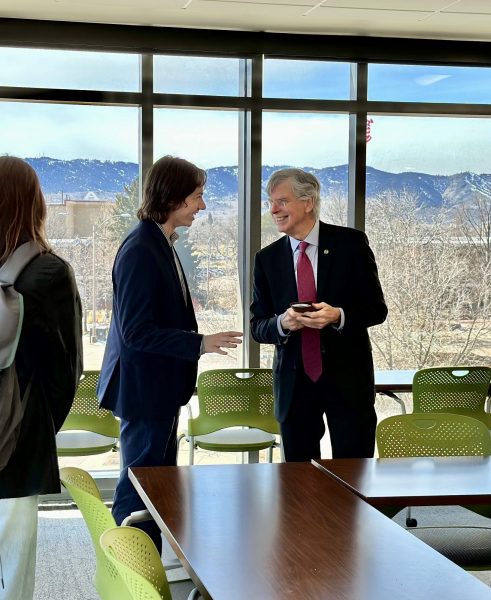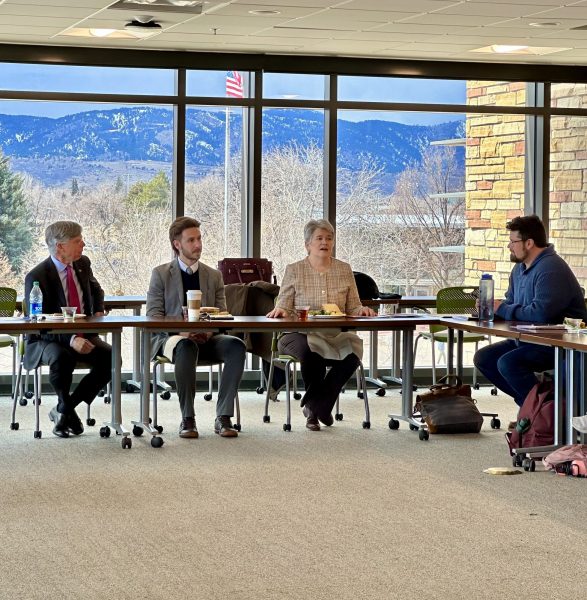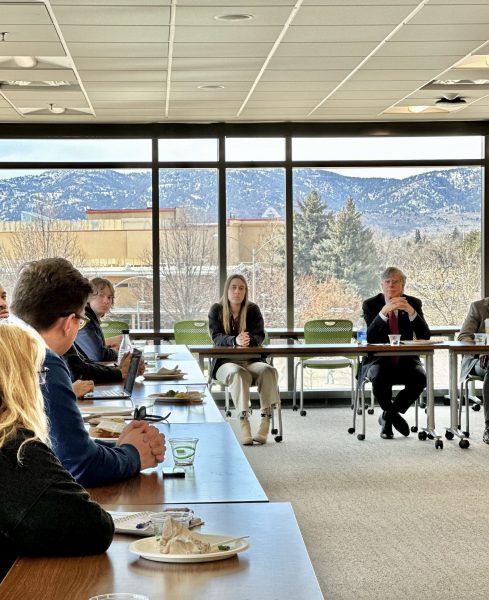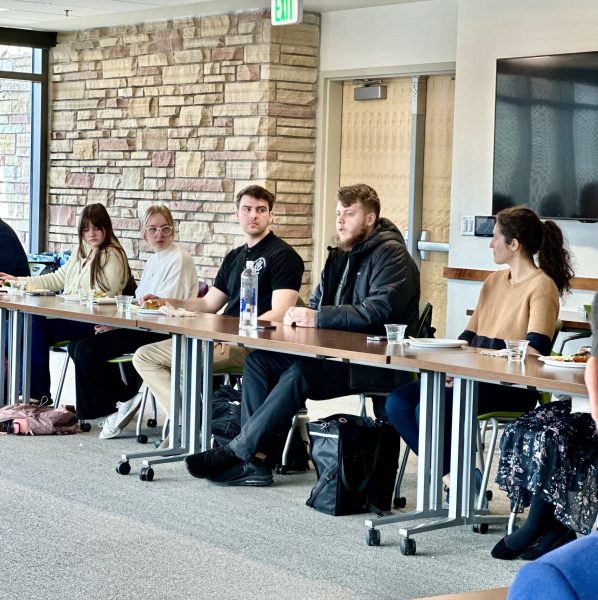
On February 28, Colorado State University welcomed Ambassador William B. Taylor to campus as keynote speaker for the 2023 CSU International Symposium. Ambassador Taylor served as chargé d’affaires at the U.S. embassy in Kyiv in 2019 and as the U.S. ambassador to Ukraine from 2006 to 2009. He is currently vice president, Europe and Russia at the U.S. Institute of Peace.
Taylor, a graduate of West Point and Harvard’s Kennedy School, served as an infantry platoon leader and combat company commander in the U.S. Army in Vietnam and Germany. Taylor has an extensive history in public service — from coordinating U.S. assistance to the former Soviet Union and Eastern Europe in the 1990s to overseeing U.S. assistance and support to Egypt, Tunisia, Libya and Syria during the Arab Spring, as well as serving in Kabul, Baghdad and Jerusalem in the 2000s.
The Straayer Center for Public Service Leadership had the honor of hosting a luncheon for Ambassador Taylor during his time on campus. In attendance were CSU student leaders, faculty from the Department of Political Science, staff of the Straayer Center — and accompanying the ambassador was Kathleen Fairfax, Vice Provost for International Affairs.

After his opening remarks, Taylor spent time answering several pre-submitted questions from students regarding his background as a public service leader, his recommendations for pursuing a career in public service, and his experience living in Ukraine. He discussed his history in the military followed by the transition to public service. When asked the one piece of advice he would give to students today, he replied, “I encourage you to explore a wide variety of opportunities and always be open-minded to a career change.”

Following the one-year anniversary of the Russian invasion, the group spent a vast majority of the luncheon openly discussing the current status of Russia’s war in Ukraine. With close friends and colleagues remaining in the region, Taylor recalled stories of their experiences living in now war-torn Ukraine. Sharing a story from a close friend living in Kyiv, Taylor says “she is forced to walk up and down seventeen flights of stairs carrying jugs of water for herself and her young daughter.”
With Russian forces deliberately targeting civilian infrastructure such as Ukranian energy systems, there is a constant threat of power outages, making use of an elevator extremely risky. Loss of power also affects access to clean water — without which there is no running water, no reliable water purification, and untreated wastewater disposed of in rivers and lakes, leading to water-related disease outbreaks. In addition to the attack on energy sources, there have also been explicit attacks directly on water infrastructure such as dams and many other critical water-related facilities.
Ambassador Taylor was in Kyiv just three weeks prior to the Russian invasion. He recalls intelligence agencies from both the U.S. and the U.K. briefing President Zelensky about the possibility of an attack, though most experts were in disbelief that Russian President Vladimir Putin would do something so radical as to invade Ukraine. With 180,000 Russian troops surrounding the Ukrainian border, Russia launched their invasion on February 24, 2022. With warning from intelligence agencies, Zelensky prepared his troops and relocated armor in the weeks and months prior but did not alert the public to the possibility of an attack. He needed Ukrainians to want to stay—he needed them to fight for their country. And Ukrainians did just that—citizens lined up in droves at military recruiting stations on the day of the invasion and in the weeks following. The Ukrainian people overwhelmingly responded to defend themselves.

When asked about Ukranian morale, Ambassador Taylor turned to Ukrainian student Oleg Soloviov — a sophomore studying political science — to weigh in on the subject. Soloviov is from the city of Odessa located in the south-west region of the country. Soloviov discussed the high morale of his fellow Ukrainians who are fighting for their homes, their communities, their families, and their country. They are fighting for their existence.
Taylor emphasized the importance of Ukraine winning this war—sending a message to Russians, in particular Putin, that “might doesn’t make right.” There is also a moral component behind the need for Ukraine to succeed. The atrocities and war crimes committed by Russian forces—mass murder, torture, rape, the kidnapping of Ukrainian children who were then deported to Russia, and the targeting of civilian areas—is attempted genocide. The Russian Armed Forces are seeking to erase Ukrainian culture and heritage by targeting more than 250 Ukrainian museums and institutions—either destroying the buildings entirely or seizing art in an attempt to rewrite Ukrainian cultural history.
With the war being at a stalemate for months, people are asking how they can help. Taylor suggests talking to your congresspeople and senators letting them know that support for Ukraine is important to you. He also suggests visiting the United24 website, the official fundraising platform of Ukraine. Donors get to decide where their funds will be distributed: Defense and Demining, Medical Aid, or Rebuild Ukraine. Taylor hopes the world will continue to unite in support of Ukraine—to protect, save, and rebuild the country.
